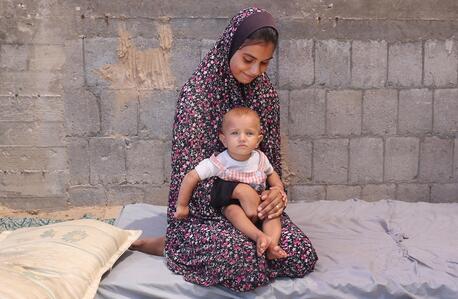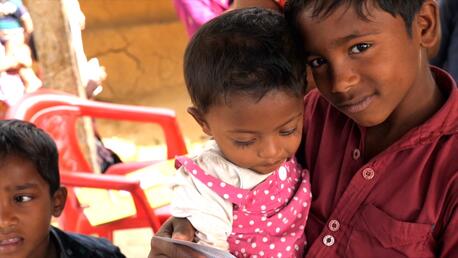
Ibtihaj Muhammad Has a Calling
The first Muslim-American woman to earn an Olympic medal, winning a bronze in fencing at the 2016 Games in Rio, talks to UNICEF USA about her recent trip to Africa to connect to her ancestral roots, her interest in helping refugees and her advice to others hoping to make a difference in the world.
You've been very busy as an advocate, lending your voice to causes you believe in. How did that start?
IBTIHAJ MUHAMMAD: I visited Rwanda two summers ago, and I had the best time utilizing sport as a way to connect with people from other countries. I’ve traveled to quite a few places as a representative for our country, but for me, the most meaningful trips are those focused around humanitarian work.
Which issues are your priorities going forward?
IBTIHAJ MUHAMMAD: I would say improving access to clean drinking water. I’ve worked with the American Relief Agency in Horn of Africa (ARAHA) and Kids Play International to build water wells in East Africa. And I realize how clean drinking water can change the dynamic of a community, by enabling women and girls to go to school or get jobs rather than spend their days traveling far distances to fetch water.
I feel such a strong connection to kids.
As a UNICEF Supporter, what interests you the most about UNICEF’s work?
IBTIHAJ MUHAMMAD: The focus on children. Maybe it’s because I have nieces and nephews who are super young, but I feel such a strong connection to kids. I like the work that UNICEF does for children all over the world, particularly refugees and those who are displaced. There are so many who need our help. I think it would be really cool if I could work more closely with UNICEF. I will go wherever UNICEF thinks I can be helpful. For me, what happens on the ground, the potential to interact and connect with people and make a real difference is more important than the destination itself.
For Black History Month, UNICEF USA is highlighting the invaluable contributions of African-Americans to UNICEF's work to support and protect children around the world. What does Black History Month mean to you?
IBTIHAJ MUHAMMAD: As a person of the diaspora, I have always been connected to my history as an African-American. I had the opportunity to travel to Nigeria and Ghana recently, to visit the different ports and castles where slaves were kept in dungeons for months before being shipped to the Americas. I wanted to learn more about the atrocities that were committed against black people. And as hurtful as these things are, even hundreds of years later, it was important for me to understand where my family is from, and why these things happened.
I majored in African studies at university, and there is so much that we do not talk about, that we don't educate ourselves or our children about. I think that’s why we have problems in our society today. Because we are ignoring the history. Whether you identify as African-American or Nigerian, whether you find yourself in the U.K. or South America or North America, whether you identify as being African by birth or you’re born and raised in New Jersey like me, we’re all connected by this history.
Who is your greatest influence, the person who really shaped who you are today?
IBTIHAJ MUHAMMAD: Muhammad Ali — not just as an athlete, but as a Muslim, an activist and especially as a humanitarian. I feel so connected with him and his legacy. His faith guided him, and it’s the same for me. My faith is what calls me to give back, and to think about people collectively instead of in terms of how they affect me personally. I feel inclined to speak out and to act on certain social issues, to try to benefit society as a whole, because I know that that's what my faith calls me to do.
It’s really important for me to be an agent of change and to use my voice.
This is particularly important in a post 9/11 America that is super anti-Muslim. The narrative around my community is dark. I feel I have to do what I can to shed a more positive light in a way that is meaningful for me but also to others who may not live in open, diverse New York. It’s really important for me to be an agent of change and to use my voice. And I feel like I get that sense of courage and urgency from Muhammad Ali and his legacy.
If you had the opportunity to say something to Muhammad Ali, what would you say?
IBTIHAJ MUHAMMAD: I would probably say “Thank you.”
Why did you write a children's book? ["The Proudest Blue," to be released on Oct. 22]
IBTIHAJ MUHAMMAD: I wanted to represent kids who aren’t represented in many children’s books [written in English]. To increase understanding and acceptance among children who are different from each other. Being different doesn’t mean you should be treated differently. We can send this message through literature, help kids relate to one another and have it be this unconscious thing instead of something you have to think about. It's my hope that not just Muslim kids or black kids or kids who wear hijab read this book.
What advice do you have for others who are looking to make a difference?
IBTIHAJ MUHAMMAD: Don't be discouraged by the current political climate, or by one obstacle or speed bump. I've faced so much pushback in my career as an athlete. Had I allowed those moments to deter me from my ultimate goal of representing our country at the highest level of sport, I wouldn't be where I am today. My mother taught me early on: Don’t rely on other people to encourage or motivate you. We have to do that for ourselves first.
And so much of confidence is faking it ’til you make it. I'm not always the most confident person in the room, I don't always feel super beautiful, I don't always feel in shape. But you better believe I am feeding myself positive energy all the time, even when all I wanna do is lie on my couch and Netflix binge (laughs).
Top photo: Ibtihaj Muhammad on the beach in Sealine, Qatar in February 2019. © photo courtesy of Ibtihaj Muhammad
HOW TO HELP
There are many ways to make a difference
War, famine, poverty, natural disasters — threats to the world's children keep coming. But UNICEF won't stop working to keep children healthy and safe.
UNICEF works in over 190 countries and territories — more places than any other children's organization. UNICEF has the world's largest humanitarian warehouse and, when disaster strikes, can get supplies almost anywhere within 72 hours. Constantly innovating, always advocating for a better world for children, UNICEF works to ensure that every child can grow up healthy, educated, protected and respected.
Would you like to help give all children the opportunity to reach their full potential? There are many ways to get involved.





